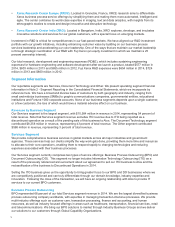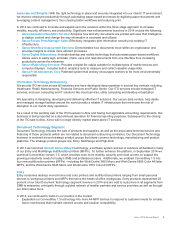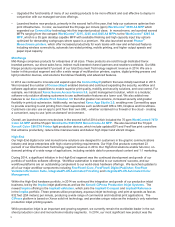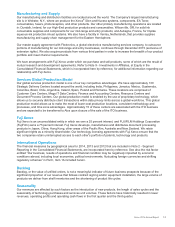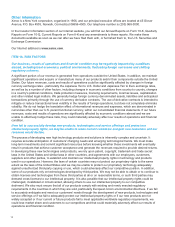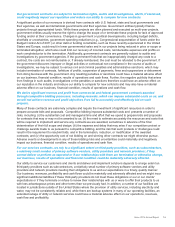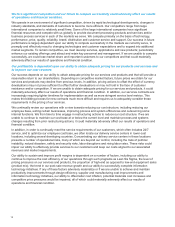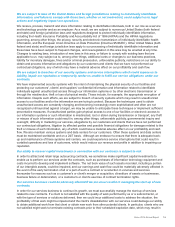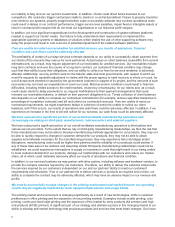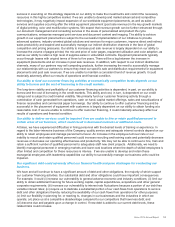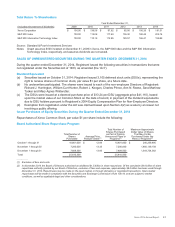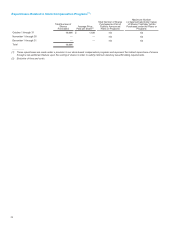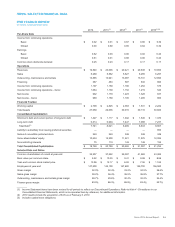Xerox 2014 Annual Report Download - page 29
Download and view the complete annual report
Please find page 29 of the 2014 Xerox annual report below. You can navigate through the pages in the report by either clicking on the pages listed below, or by using the keyword search tool below to find specific information within the annual report.Our government contracts are subject to termination rights, audits and investigations, which, if exercised,
could negatively impact our reputation and reduce our ability to compete for new contracts.
A significant portion of our revenues is derived from contracts with U.S. federal, state and local governments and
their agencies, as well as international governments and their agencies. Government entities typically finance
projects through appropriated funds. While these projects are often planned and executed as multi-year projects,
government entities usually reserve the right to change the scope of or terminate these projects for lack of approved
funding and/or at their convenience. Changes in government or political developments, including budget deficits,
shortfalls or uncertainties, government spending reductions (e.g., Congressional sequestration of funds under the
Budget Control Act of 2011) or other debt or funding constraints, such as those recently experienced in the United
States and Europe, could result in lower governmental sales and in our projects being reduced in price or scope or
terminated altogether, which also could limit our recovery of incurred costs, reimbursable expenses and profits on
work completed prior to the termination. Additionally, government contracts are generally subject to audits and
investigations by government agencies. If the government finds that we inappropriately charged any costs to a
contract, the costs are not reimbursable or, if already reimbursed, the cost must be refunded to the government. If
the government discovers improper or illegal activities or contractual non-compliance in the course of audits or
investigations, we may be subject to various civil and criminal penalties and administrative sanctions, which may
include termination of contracts, forfeiture of profits, suspension of payments, fines and suspensions or debarment
from doing business with the government. Any resulting penalties or sanctions could have a material adverse effect
on our business, financial condition, results of operations and cash flows. Further, the negative publicity that arises
from findings in such audits, investigations or the penalties or sanctions therefore could have an adverse effect on
our reputation in the industry and reduce our ability to compete for new contracts and may also have a material
adverse effect on our business, financial condition, results of operations and cash flow.
We derive significant revenue and profit from commercial and federal government contracts awarded
through competitive bidding processes, including renewals, which can impose substantial costs on us, and
we will not achieve revenue and profit objectives if we fail to accurately and effectively bid on such
projects.
Many of these contracts are extremely complex and require the investment of significant resources in order to
prepare accurate bids and proposals. Competitive bidding imposes substantial costs and presents a number of
risks, including: (i) the substantial cost and managerial time and effort that we spend to prepare bids and proposals
for contracts that may or may not be awarded to us; (ii) the need to estimate accurately the resources and costs that
will be required to implement and service any contracts we are awarded, sometimes in advance of the final
determination of their full scope and design; (iii) the expense and delay that may arise if our competitors protest or
challenge awards made to us pursuant to competitive bidding, and the risk that such protests or challenges could
result in the requirement to resubmit bids, and in the termination, reduction, or modification of the awarded
contracts; and (iv) the opportunity cost of not bidding on and winning other contracts we might otherwise pursue.
Adverse events or developments in any of these bidding risks and uncertainties could materially and negatively
impact our business, financial condition, results of operations and cash flow.
For our services contracts, we rely to a significant extent on third-party providers, such as subcontractors,
a relatively small number of primary software vendors, utility providers and network providers; if they
cannot deliver or perform as expected or if our relationships with them are terminated or otherwise change,
our business, results of operations and financial condition could be materially adversely affected.
Our ability to service our customers and clients and deliver and implement solutions depends to a large extent on
third-party providers such as subcontractors, a relatively small number of primary software vendors and utility
providers and network providers meeting their obligations to us and our expectations in a timely, quality manner.
Our business, revenues, profitability and cash flows could be materially and adversely affected and we might incur
significant additional liabilities if these third-party providers do not meet these obligations or our or our clients'
expectations or if they terminate or refuse to renew their relationships with us or were to offer their products to us
with less advantageous prices and other terms than we previously had. In addition, a number of our facilities are
located in jurisdictions outside of the United States where the provision of utility services, including electricity and
water, may not be consistently reliable and, while there are backup systems in many of our operating facilities, an
extended outage of utility or network services could have a material adverse effect on our operations, revenues,
cash flow and profitability.
Xerox 2014 Annual Report 14



